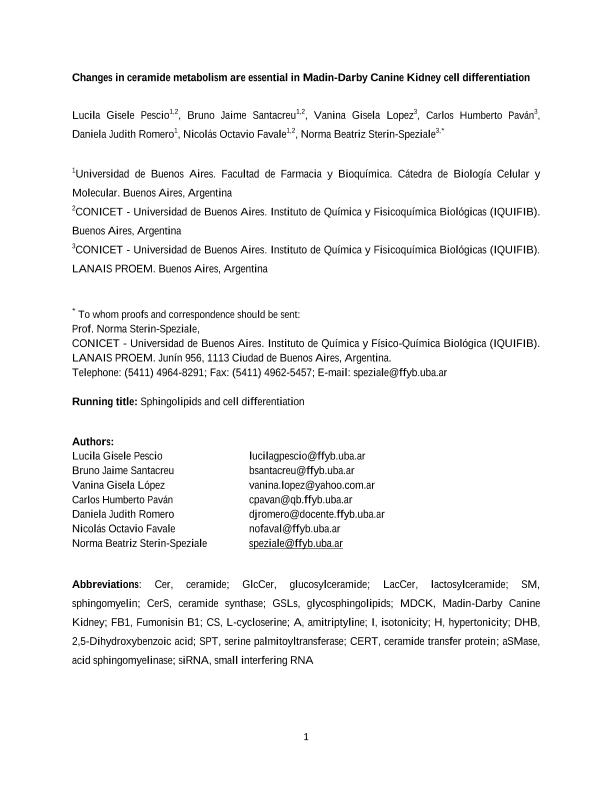Artículo
Changes in ceramide metabolism are essential in Madin-Darby canine kidney cell differentiation
Pescio, Lucila Gisele ; Santacreu, Bruno Jaime
; Santacreu, Bruno Jaime ; Lopez, Vanina Gisela
; Lopez, Vanina Gisela ; Pavan, Carlos Humberto
; Pavan, Carlos Humberto ; Romero, Daniela Judith
; Romero, Daniela Judith ; Favale, Nicolas Octavio
; Favale, Nicolas Octavio ; Sterin, Norma Beatriz
; Sterin, Norma Beatriz
 ; Santacreu, Bruno Jaime
; Santacreu, Bruno Jaime ; Lopez, Vanina Gisela
; Lopez, Vanina Gisela ; Pavan, Carlos Humberto
; Pavan, Carlos Humberto ; Romero, Daniela Judith
; Romero, Daniela Judith ; Favale, Nicolas Octavio
; Favale, Nicolas Octavio ; Sterin, Norma Beatriz
; Sterin, Norma Beatriz
Fecha de publicación:
07/2017
Editorial:
American Society for Biochemistry and Molecular Biology
Revista:
Journal of Lipid Research Papers In Press
ISSN:
0022-2275
e-ISSN:
1539-7262
Idioma:
Inglés
Tipo de recurso:
Artículo publicado
Clasificación temática:
Resumen
Ceramides and complex sphingolipids with defined acyl-chain lengths play important roles in numerous cell processes. Six ceramide synthase isoenzymes (CerS1-6) are the key enzymes responsible for the production of the diversity of molecular species. In this study, we investigated the changes in sphingolipid metabolism during the differentiation of Madin-Darby Canine Kidney (MDCK) cells. By MALDI TOF TOF MS, we analyzed the molecular species of ceramide (Cer), glucosylceramide (GlcCer), lactosylceramide (LacCer) and sphingomyelin (SM) in non-differentiated and differentiated cells (cultured under hypertonicity). The molecular species detected were the same, but cells subjected to hypertonicity presented higher levels of C24:1 Cer, C24:1 GlcCer, C24:1 SM and C16:0 LacCer. Consistently with the molecular species, MDCK cells expressed CerS2, CerS4 and CerS6, but with no differences during cell differentiation. We next evaluated the different synthesis pathways with sphingolipid inhibitors and found that cells subjected to hypertonicity in the presence of amitriptyline, an inhibitor of acid sphingomyelinase, showed decreased radiolabeled incorporation in LacCer and cells did not develop a mature apical membrane. These results suggest that hypertonicity induces the endolysosomal degradation of SM, generating the Cer used as substrate for the synthesis of specific molecular species of glycosphingolipids that are essential for MDCK cell differentiation.
Palabras clave:
Ceramides
,
Glycolipids
,
Kidney
,
Cell Differentiation
Archivos asociados
Licencia
Identificadores
Colecciones
Articulos(IQUIFIB)
Articulos de INST.DE QUIMICA Y FISICO-QUIMICA BIOLOGICAS "PROF. ALEJANDRO C. PALADINI"
Articulos de INST.DE QUIMICA Y FISICO-QUIMICA BIOLOGICAS "PROF. ALEJANDRO C. PALADINI"
Citación
Pescio, Lucila Gisele; Santacreu, Bruno Jaime; Lopez, Vanina Gisela; Pavan, Carlos Humberto; Romero, Daniela Judith; et al.; Changes in ceramide metabolism are essential in Madin-Darby canine kidney cell differentiation; American Society for Biochemistry and Molecular Biology; Journal of Lipid Research Papers In Press; 58; 7; 7-2017; 1428-1438
Compartir
Altmétricas



